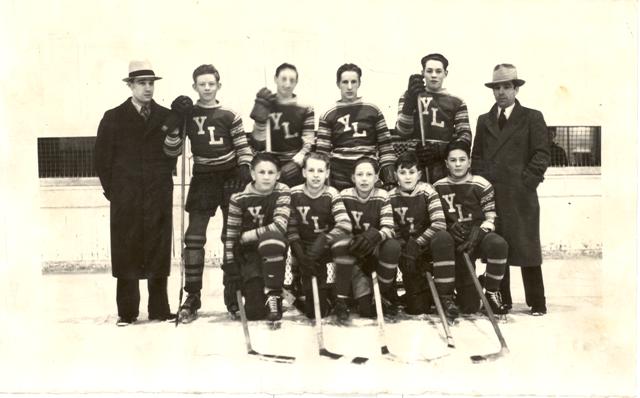In this post in our series of B.C. places used as room names in the Irving K. Barber Learning Centre, we are going to feature Trail, B.C. We are also going to talk about archival appraisal, but first- a little bit about Trail!
Trail is a city in the Western Kootenay region of B.C., founded as a gold/copper ore mining and smelting town at the turn of the 20th century. Smelting is still the major industry in Trail, but in their spare time Trail residents take their sports very seriously- according to the City of Trail website, “Trail has been declared BC’s Number One Sports Town offering a wealth of sports – from golfing and fishing to mountain biking, hiking and skiing, and especially hockey.”
It seems very apropos then to feature this photograph of a Trail hockey team from 1938:
This photograph is found in the W.G. Burch fonds. Gerry Burch, as he is known, is a retired forester who grew up in Trail, and who donated his archival material to Rare Books and Special Collections, because he knows that our researchers are very interested in forest history (you can read more about our forestry history holdings through our Forestry History Research Guide).
So what, you may be wondering, does this hockey team have to do with forestry history? Why is this photograph kept as part of the collection? This is when a decision of archival appraisal is made. Unlike monetary appraisal, archival appraisal is a decision made to determine what is kept, and not kept, for long term preservation in an archival institution. Society simply creates too much documentation to preserve it all- it is an important part of an archivist’s role to make appraise archival material for what we call “retention”.
There are a lot of viewpoints that an archivist can use to make appraisal decisions, but generally, we archivists are looking for evidential or informational value in the records selected for preservation. In the example of the W.G. Burch fonds, the documents in the fonds that he generated during his career as a forester provide evidential value about forestry practices in B.C., and his activities more specifically. In the case of this hockey photograph, taken during Gerry’s youth (he’s in the back row on the far right) it provides informational value about the history of a B.C. town- in this case, Trail. Another factor that archivists would consider is the value in keeping the archives of a person or an organization together- we try our best to avoid “splitting a fonds” between archival institutions because the best way to understand a person’s life and work is to have the context of their archives remain intact.
In the Barber Centre, the Trail Meeting Room is room 491, which is part of the iSchool at UBC (the School of Library, Archival and Information Studies). iSchool students in the Masters of Archival Studies program learn about appraisal in ARST 520: Selection and Acquisition of Archival Documents.
